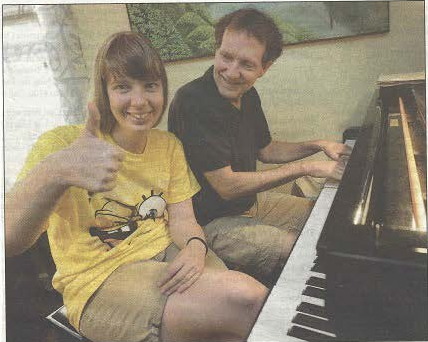Mac-grove's McDonough and His Quartet to Unveil Their Innovative Rhythms
Highland Villager
Wednesday, June 22, 2016
By Larry Englund
Macalester- Groveland pianist Larry McDonough serenades his daughter Rosie with a song he wrote based on a melody that she composed.
Photo by Brad Stauffer
= = =
The Twin Cities Jazz Festival will return to St. Paul on June 23-25 with more than 100 shows on 20 stages downtown and several other stages across the city. “We’ve added a new stage at Kellogg Park, and this year we have a third night of headliners at Mears Park,” said festival director Steve Heckler, who expects to attract between 25,000 and 30,000 fans of jazz.
Headlining the 18th annual event will be New Orleans trombonist Delfeayo Marsalis and 12-year-old piano prodigy Joey Alexander on Thursday; pianist Ellis Marsalis, the Clearwater Hot Club, and Sonny Knight and the Lakers on Friday; pianist Jon Weber and- drummer Francisco Mela & Friends, Michael Franti & Spearhead, the Pete Whitman X-tet with Lucia Newell, guitarist Russell Malone and guitarist John Pizzarelli on Saturday.
Another one of the more than 300 performers is Macalester-Groveland pianist Larry McDonough. A working musician since his teenage years, McDonough has been a lawyer for over 30 years. For the past three years he has worked at Dorsey & Whitney as the director of pro bono work. “I like being a musician, but I've always been a lefty and was drawn to work that was more fundamental to people's needs,” he said.
McDonough’s wife is classical flutist Carol Bergquist. Two of his three children are now living on their own, and he has been playing with his band more and more these days. McDonough will appear with his AcoustElectric Quartet in a Jazz Fest gig at 7 p.m. Friday at the SW Craft Bar in downtown St. Paul. The following week, he will perform with his sextet in a tribute to the music of Chet Baker and Miles Davis at 7 p.m. Wednesday, June 29, at the Dakota Jazz Club in downtown Minneapolis.
McDonough's AcoustElectric Quartet specializes in original music and arrangements played with odd meters. Most songs are played in familiar meters such as 4/4 or 3/4 time. McDonough uses 5/4,7/4 and even 9/4 rhythms. “We did it at the Jazz Festival last year and it went over really well,” he said.
McDonough first got interested in odd meters about 16 years ago while exploring the music of Sting. “Until then, I hadn't noticed that each of Sting's albums has some odd-metered tunes. They're all so cleverly written that unless you counted it out, you wouldn't notice it. And they're so well written that people can dance to them.” McDonough had the music to Billy Strayhorn's “Take the A Train” on his piano at the time. “I tried to play it in 5/4 time and it was terrible,” he said. But he stuck with it and after a few weeks of practice he said he found that he could play it in 5/4 and improvise off of that. He realized that he was improvising “totally differently. With the new rhythm, it became this totally interesting piece.”
McDonough applied odd meters to other songs, and began writing songs in odd meters as well. “I was writing in 5/4 time and started writing in 9/4 and 11/4 time,” he said. “The odd meters all have an element of putting the listener a little bit off center. But like any kind of music, if you develop a groove in your head, it provides the structure; and you just feel the music.”
For the Jazz Festival, McDonough and his group will play a mix of originals and covers. “We'll do a first set of acoustic tunes,” he said. “We’re doing a Prince tune ‘Question of U’ in 5/4 time and ‘La Marseillaise,’ the French national anthem, as a jazz waltz. In the second, electric set, we'll do an arrangement of ‘'Layla’ as a jazz fusion waltz and a Sting song, 'She's Too Good for Me,’ as a bebop tune in 5/4 time.”
The group will also do a couple of originals based on melodies written by children with developmental disabilities. “Every album I've released in the past 10 years has had a tune that originated from a kid with special needs pulling together a few notes,” said McDonough, whose daughter Rosie is an adult with special needs. The melodies were developed with the help of a software program written by drummer Dan Moffett, who has two children with special needs. “There would be colors on the screen in little boxes, and the kids could touch the screen and a note would sound,” said McDonough, who then used the melodies to compose new songs.
Working with the children's four- and five-note melodies “opened up my thinking about harmony,”McDonough said. “These melodies could not be written with conventional harmonies, so I decided to harmonize them wherever they took me, and it changed how I write music. These
kids with limited cognition and no formal musical training taught me to think differently about harmony and structure.”
Joining McDonough in the AcoustElectric Quartet will be Richard Terrill on saxes, Dean White on drums and Graydon Peterson on bass. The sextet on June 29 at the Dakota will also include Steve Kenny on trumpet, Jeff King on saxes, and Jim Bierma on bass.

